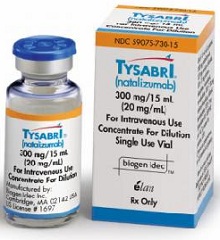 |
| Tysabri--courtesy of Biogen Idec |
If persistence is a virtue, then Biogen Idec ($BIIB) is about as virtuous as they come. After years of safety problems, warnings, testing and retesting, the company has asked U.S. and European authorities to approve its multiple sclerosis drug Tysabri for first-line use.
Tysabri, an injectable treatment, is now approved for use in patients who've failed on other therapies. Last year, Biogen's share of Tysabri sales amounted to $840 million for the first 9 months. Winning the right to market Tysabri to newly diagnosed patients--a bigger pool--could be very lucrative for Biogen and its partner Elan ($ELN).
The applications are complicated, however, because of Tysabri's history. First approved in 2004, Tysabri was pulled from the market after patients died from an unusual brain infection, progressive multifocal leukoencephalopathy, or PML. But the drug was quite effective, so FDA allowed Tysabri to re-enter the marketplace in 2006 under a strict risk-management program.
Patients did continue to die from PML, at about the rate Biogen predicted, and the company publicly updated those statistics on a regular basis. Despite the risks, patients continued to choose Tysabri; according to Biogen's latest quarterly filing with securities regulators, about 71,000 patients are now using the drug.
Meanwhile, Biogen has been working on a diagnostic test that can identify patients who have antibodies to the JC virus, which causes PML. The company won FDA approval for that diagnostic last year. The agency also allowed revisions to Tysabri's label noting the ability to identify virus carriers.
All of that built a foundation for the new drug-approval apps. Basically, Biogen and Elan are asking regulators to approve Tysabri for use in those who test negative for those antibodies, an estimated 45% of MS patients. Right now, Reuters notes, Tysabri is limited to 10% to 12% of treated MS patients.
As Biogen has forged ahead on Tysabri, it's also been developing another MS treatment, BG-12, administered orally. Meanwhile, Novartis ($NVS) won approval for its MS pill Gilenya. So, Tysabri wouldn't be without new competition in the MS market. But according to Reuters, analysts have said Tysabri's market share could grow to 15% by 2015 with the new approval. In that case sales could amount to $2.9 billion.
- read the release from Biogen
- get the Reuters story
- see the Boston Business Journal piece